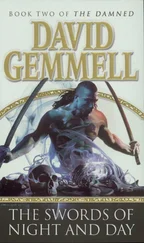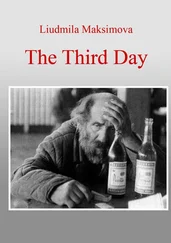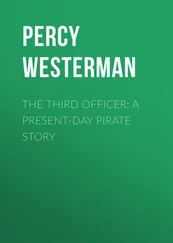David Epperson - The Third Day
Здесь есть возможность читать онлайн «David Epperson - The Third Day» весь текст электронной книги совершенно бесплатно (целиком полную версию без сокращений). В некоторых случаях можно слушать аудио, скачать через торрент в формате fb2 и присутствует краткое содержание. Жанр: Фантастика и фэнтези, на английском языке. Описание произведения, (предисловие) а так же отзывы посетителей доступны на портале библиотеки ЛибКат.
- Название:The Third Day
- Автор:
- Жанр:
- Год:неизвестен
- ISBN:нет данных
- Рейтинг книги:3 / 5. Голосов: 1
-
Избранное:Добавить в избранное
- Отзывы:
-
Ваша оценка:
- 60
- 1
- 2
- 3
- 4
- 5
The Third Day: краткое содержание, описание и аннотация
Предлагаем к чтению аннотацию, описание, краткое содержание или предисловие (зависит от того, что написал сам автор книги «The Third Day»). Если вы не нашли необходимую информацию о книге — напишите в комментариях, мы постараемся отыскать её.
The Third Day — читать онлайн бесплатно полную книгу (весь текст) целиком
Ниже представлен текст книги, разбитый по страницам. Система сохранения места последней прочитанной страницы, позволяет с удобством читать онлайн бесплатно книгу «The Third Day», без необходимости каждый раз заново искать на чём Вы остановились. Поставьте закладку, и сможете в любой момент перейти на страницу, на которой закончили чтение.
Интервал:
Закладка:
“For the first human trial, Henry simply went back to the previous hour. Once we confirmed that success, we decided to run a second experiment, to a place and time where he could easily survive and earn a living in case he could not, for some unexpected reason, return to the present.”
“Makes sense,” nodded Markowitz. “Where did he go?”
“Dallas; November 1963. Had he been trapped there, his scientific talents would have proven useful. I doubt he would have had trouble finding employment, and as you’re already aware, he would know exactly where to invest any money he happened to earn.”
Markowitz chuckled. “Don’t tell me he was a conspiracy theorist!”
She shook her head. “Not at all. He considered them unbalanced souls with overly active imaginations and too much time on their hands.”
“So why that particular moment?”
She smiled. “If we were going to perform a test anyway, why not clear up some other mystery while we were at it?”
She opened a cabinet and removed a DVD. Then, she dimmed the lights, dropped the disk into the machine and pressed ‘play.’ For a brief moment, the screen remained blue, with only the date and time stamp showing at the bottom right-hand corner. 1963 11 22 12:27:31 .
“Two minutes,” she said.
The image that came to light was that of a long, narrow grass-covered slope about thirty yards long and bounded at the top by a low wooden stockade-style fence and a concrete pergola.
A few people walked quickly by, heading toward the east where the President’s motorcade was turning onto Houston Street, but the others — I counted nine — seemed content to remain where they were. One even had a movie camera.
“OK. Here we go.”
Five seconds later, three shots rang out — audible, though not obvious in the midst of the crowd noise. Then came the screams. Still, the camera did not move, but remained focused on the fence and the trees marking the edge of the slope.
Despite the chaos nearby, the camera recorded nothing of consequence.
“The Grassy Knoll?” asked Bergfeld.
“Nothing but grass,” said Bryson. “No hidden gunmen at all. I’m sorry to disappoint you.”
She didn’t reply. Like most natives of Dallas, Sharon felt the faster that memories of Kennedy’s assassination faded, the better — something that was easy for her anyway, since she had been born over a decade after the event.
“So who did it?” asked Markowitz.
“How would I know?” Bryson replied. “You’ve read the books; you’ve seen the web sites. There are dozens of those nutty theories. This only disproved one of them.”
“Why didn’t he try to stop it?” asked Sharon. “He could have called the police.”
Juliet shook her head.
“Suppose he had made that call. Suppose he found a pay phone earlier that morning: There’s someone on the sixth floor of the Texas School Book Depository waiting with a rifle to shoot the President . Let’s suppose he had said that. Then what?”
“Someone would have checked,” replied Sharon.
“Yes,” said Juliet, “with information that specific, someone certainly would have investigated. But as you know, Oswald was quite willing to kill police officers; he did, in fact, murder one after shooting Kennedy.”
“So,” she continued, “it’s likely that he would have killed at least one policeman or Secret Service agent as they tried to apprehend him. Afterward, as with any police shooting, the rest of the force would have been very angry. One of their own had gone down.”
“They’d look for others,” said Lavon; “other conspirators.”
“Beginning exactly with the person who made that call,” said Bryson. “They could easily trace the pay phone as well as the precise time the call was placed. Other witnesses could identify the person on the phone. Ask yourself, as the Secret Service surely would have, who else would have known the gunman was hiding in the building besides a co-conspirator who had gotten cold feet?”
“That’s how a lot of conspiracies come to light,” I added. “Somebody chickens out at the last minute.”
“He could have explained,” said Sharon.
“How?” asked Bryson. “I’m from the future and I’m here to help?”
“No,” she said, shaking her head, “he could have done nothing without risking a long stretch in either prison or the lunatic asylum. Besides, if Kennedy had not died in Dallas, someone else may have gotten him at his next stop. The what-if games are endless.”
“He could have changed history,” said Markowitz.
Juliet’s expression grew solemn. “Yes; and you will all have to be careful that you do not. It’s time I explained some ground rules.”
Chapter 10
The Brysons had debated the subject endlessly among themselves: could a single event or individual really change the future in a meaningful way?
Juliet had leaned toward the perspective that one could. In her view, people tended to look at the broad sweep of human affairs without imagining how close some of the most important turning points really were.
What if, she had argued, the wind had shifted direction on that fateful August day in 1776, allowing the British fleet to sail up the East River and trap George Washington on Long Island, snuffing out the American Revolution before it could truly be born?
What if a young Hitler had lingered a minute longer in a bunker on the Western Front instead of departing, as he did, just before an Allied shell struck, killing everyone?
The possibilities were endless.
Her husband had started with the opposite view. Humans for the most part went about their business and then died; and the next generation did the same. Even the seemingly grand events were inevitable in their own way.
Had Grant been in command in 1863 instead of the more cautious Meade, Union forces might have trapped Lee’s Confederates after Gettysburg, thus shortening the American Civil War. But whether the conflict had ended then, or as it actually did two years later, the North still would have won.
Henry considered this principle even more self-evident in scientific endeavors. Alexander Graham Bell had beaten his rival Elisha Gray to the patent office by only a few days — and though little known today, the controversy over who invented the telephone had dragged on for years, complete with sordid tales of the bribery of an alcoholic patent clerk.
Had the Wright Brothers never been born, he argued, someone else surely would have invented the airplane, an assertion bolstered by the fact that the Wrights themselves spent much of the decade after their initial success in the courtroom, fighting infringement litigation against other aircraft manufacturers.
“How did you resolve the issue?” Sharon asked.
“We agreed to disagree,” said Bryson, “though in the end, I could tell that he was coming around to my point of view.”
Sharon smiled, and the two women exchanged surreptitious glances, as if to say that even the most dim-witted men eventually did the same.
“Practically speaking, what did you end up doing?” I asked.
“Since we couldn’t answer the question with certainty, we decided that except for the camera, Henry would take no other modern implements back with him: no weapons, no explosives, not even a flashlight.”
We all agreed with the logic, although Juliet must have sensed my discomfort with the notion of having no real means of self-defense.
She looked me squarely in the eye.
“Henry agreed to follow this protocol,” she said, “and I’m going to insist you do likewise, even under our current circumstances. Do you still want to go?”
After a moment’s reflection, I gave a half-hearted grunt, in the affirmative.
Читать дальшеИнтервал:
Закладка:
Похожие книги на «The Third Day»
Представляем Вашему вниманию похожие книги на «The Third Day» списком для выбора. Мы отобрали схожую по названию и смыслу литературу в надежде предоставить читателям больше вариантов отыскать новые, интересные, ещё непрочитанные произведения.
Обсуждение, отзывы о книге «The Third Day» и просто собственные мнения читателей. Оставьте ваши комментарии, напишите, что Вы думаете о произведении, его смысле или главных героях. Укажите что конкретно понравилось, а что нет, и почему Вы так считаете.












